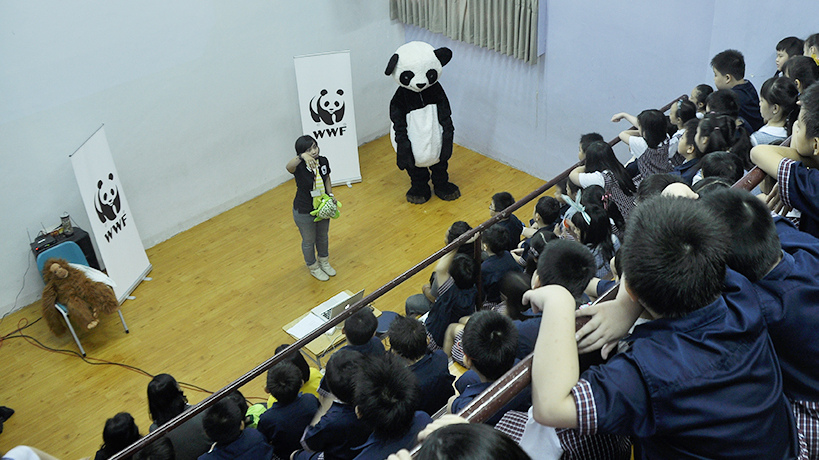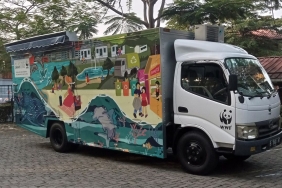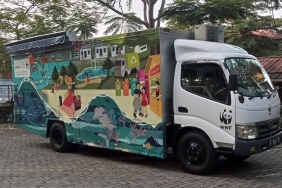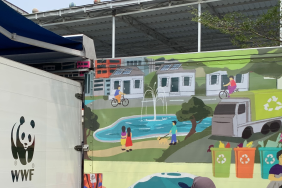PANDA MOBILE INTRODUCES CITA PERSADA SCHOOL TO VARIOUS PROFESSIONS IN THE CONSERVATION FIELD
On Thursday (23/01), Cita Persada Depok School was visited by WWF-Indonesia's Panda Mobile. The school invited the Panda Mobile team to give a seminar in Career Day with the theme Earth is Our Home-Work for a Better Earth.
The event began at 09.00, starting with an introduction from the Panda Mobile team representatives, Kak Sani Firmansyah and Kak Resti Octaviani in front of 53 students in grades 4-6 and teaching staff. Before starting the presentation, all students were invited to do A Ram Sam Sam gymnastics. The movements that sharpen children's motor nerves succeeded in making the atmosphere more fluid with laughter on the sidelines of the gymnastics.
"Does anyone know what WWF stands for?" asked Kak Sani, opening the presentation.
"World Wide Fund for Nature," the students replied in unison.
Almost all students at Cita Persada School already know what WWF stands for. Apparently, they had already found out about this environmental organization before the Career Day which was specially attended by WWF-Indonesia. The material presented by Kak Sani continued from the introduction of the history of WWF which was founded on September 1, 1961 with the central secretariat in Gland Switzerland. Then, Kak Sani recounted the journey of WWF-Indonesia for the first time in the research of Javan Rhinos in Ujung Kulon Banten in 1962.
The Panda Mobile team's next presentation was about Indonesia's natural conditions. This country has the third largest tropical forest in the world. Indonesia's forests, which hold a diversity of flora and fauna, are home, food providers, and breeding grounds for various types of animals and plants. In addition, forests also provide water, food, and oxygen for humans. So, humans cannot live without forests.
The fact that Indonesia's forests, flora, and fauna are facing serious threats, encourages WWF-Indonesia to make nature conservation efforts. WWF-Indonesia exists to maintain and manage Indonesia's ecosystems and biodiversity in a sustainable and equitable manner, for the welfare of present and future generations. WWF-Indonesia's conservation work is organized into various programs that focus on the preservation of forests, marine and marine resources, and human empowerment. One of WWF-Indonesia's work programs is aimed at the conservation of endangered animals. In this case, WWF-Indonesia categorizes six animals as umbrella animals, namely Sumatran tigers, Javan rhinos, orangutans, Sumatran elephants, whale sharks, and sea turtles.
Every program that WWF-Indonesia runs is supported by professionals. For example, people with expertise in tiger conservation in the forest are tasked with monitoring the animal's habitat through camera traps. In addition to explaining the type of work, the Panda Mobile team also introduced the working tools used in the field. "This is the camera for the camera trap used by our team. It is usually kept on a tree and checked within a certain period of time," said Kak Sani while showing the students the camera trap.
In addition to the presentation of material about the types of professions in nature conservation efforts, the Panda Mobile team also conveyed conservation messages to the students. The hope is that participants can protect the environment by implementing a green lifestyle in every daily activity.
"Friends, what can we do to save nature?" said Kak Resti to students in grades 4-6.
"Bring your own cutlery!"
"Bring your own tumbler!"
"Recycle!"
Based on these answers, it turns out that most students already know various simple activities that can be done to preserve nature. Kak Resti continued with an explanation of environmentally friendly lifestyles. First, saving electricity by turning off all electrical appliances that are not in use, choosing energy-efficient lamps, and drying clothes with sunlight. Second, saving water by turning off the tap when not in use, using water from washing vegetables to water plants, and bathing using a shower. In addition, Kak Resti also advised not to ignore pipe damage, because the droplets of water that leak for a day can accumulate as much as 13 liters!
Then, the third application of an environmentally friendly lifestyle is to use tissue wisely, utilize two sides of paper, and use paper that is no longer used. The fourth is to reduce, reuse, and recycle. You can do this by reducing the use of disposable equipment, choosing rechargeable batteries, recycling used equipment, bringing your own food, drink and cutlery. Kak Resti's explanation of this environmentally friendly lifestyle received responses from the participants. "Sis, I've already made a creative craft from an old tin can into a pencil case," said one 5th grade student excitedly.
After the activity, the students took a photo with the Panda Mobile team. The school hopes that the students will gain knowledge about various jobs related to the environment. Thus, students can determine the professional aspirations they want to achieve in the future. If they are called to choose a profession in conservation, then they will be part of the people who dedicate themselves to a better earth.
,>





